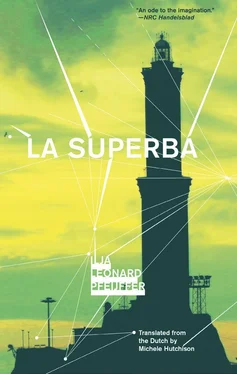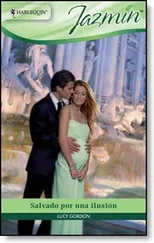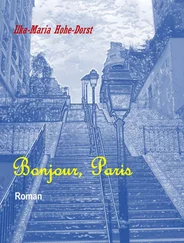We sat down inside, in the porcelain grotto, at the small round table next to the window. I ordered a Negroni and she a hot tea with Cognac.
“If you’re the one paying, I’ll have one, too. You’ll understand that, as a Genoese.”
“Thank you, signora. As a Genoese, I understand that you are doing me a service by so unambiguously accepting my hospitality and I can only hope that I will soon find myself in a situation whereby I can pay you back.”
“I see that my lessons are starting to bear fruit. You’re indebted to me for that, too.”
“I was only too aware of that.”
“What happened with the theater?”
“How do you know about that? I mean, which theater? I mean…”
“As a Genoese you ought to know that, as a Genoese, I know everything about you.”
I nodded to say that I should have known and I shook my head in response to her question.
“Parodi?”
“It didn’t go that well.”
“I hope you haven’t turned them against you. They’re powerful in this city.”
“I know that now.”
“Where is the theater actually?”
“Piazzetta Cambiaso.”
She gave me a confused look.
“That little piazza on the crossroads between Vico dietro il Coro di Santa Maria delle Vigne and Vico delle Lepre, opposite Da Francesa, the fish restaurant, between Piazza Soziglia and Via della Maddalena, actually on the corner of Piazza Lavagna.”
“I don’t know that part.”
“De Maddalena.”
“I never go there. I never go further than Piazza Soziglia and Via Luccoli.”
There you had it again. Maybe it was better that the whole project had ended in disaster. Real Genoese like the signora didn’t even dare to set foot in those alleys.
“But you know the rest of Centro Storico.”
“I’ve lived here a lot longer than my youthful appearance might suggest, Leonardo.”
“More than twenty years?”
“Don’t flatter me. At least, not in such a cheap way. I know every street in this neighborhood, Molo.”
“Do you know Vico dei Librai?”
She seemed to freeze. “Why do you ask that?”
“Oh, no reason. It’s just…”
“Did somebody ask you the way?”
“Yes, it was…”
“An old woman? Where?”
“Just next to Porta Soprana. On Salita del Prione.”
The signora made the sign of the cross.
8.
“You’ve met her,” the signora said, “the old lady of Vico dei Librai.” She was speaking softly all of a sudden, as though we were discussing someone who had just died.
“Is she famous?”
“You could say that. Or, rather, you couldn’t say that, because to be famous you at least have to exist, which in her case is definitely the question. But that question is famous. She’s a myth, but anyone staying in these dark alleys long enough, where the shadows are more skittish than the rats, runs into her sooner or later. What did she look like?”
I told her the whole story. She nodded. “Yes,” she said quietly, “that’s exactly what the other witnesses said about her. And that hundred-lira note, do you still have it?”
“No, the barman in the Barbarossa kept it. She was using it to pay for a drink, after all. But please tell me who she is.”
“Vico dei Librai doesn’t exist, at least, not anymore. It was in the area that used to be called Madre di Dio, just near the old Barbarossa city walls, at the foot of Porta Soprana. It was an old working class neighborhood. One night in 1942, the neighborhood was flattened by shelling from the English fleet. And after the war, they built that hideous new Genoa that you know, with new streets and tarmacked squares named after poets who’d have been rendered speechless at the sight of those underground motorways and fly-overs. Piazza Dante, Via D’Annunzio, and the Giardini di Plastica. Vico dei Librai used to be somewhere there. Until one winter’s night in 1942.
“The story goes that the old lady of Vico dei Librai was on her way home that evening. She’d taken bread to the orphans and flowers to the church. She was later than usual that night because she’d had to shelter from the bombing. When things finally quieted down, she continued on her way home. She was overcome by the cold somewhere near Campo Pisano. She stopped to rest on the steps of the doorway to a palazzo and passed out. Or died. Or maybe it’s the same thing. But when she woke up, her neighborhood didn’t exist anymore. Since then she’s been roaming the city, particularly on bitter winter nights, asking the way to Vico dei Librai in antiquated Genoese dialect.”
9.
In terms of ghosts and spirits, I’ve had a clear policy all my life. Although there is no scientific evidence for their existence and every checkable and verifiable foundation of modern metaphysics excludes the possibility of their existence, I’ve always chosen, against my better judgment, to believe in their existence because it’s more amusing than justifiably not believing in them. The stories are too wonderful to dismiss as nonsense and then ignore. I’ve believed in them as I’ve believed in the characters of novels who have come into my life and whom I understand in so much as they play a part in a story that interests me. And in that way, I can picture them as fully alive.
But you can imagine, dear friend, that it’s a rather unsettling experience if ghosts suddenly decide to exist on their own, instead of me beneficently allowing them to exist. That’s not what’s supposed to happen. Then I lose control. Neither do I want a character in a novel whom I’ve invented to come and sit down at my table and interfere with my chapter structure and the way I’m depicting him, threatening to inform the trade union for fictional figures about my dubious practices and considering taking that ultimate measure: going on strike. That would be a pretty mess. It happened to me before, with my last book, Real Life: A Novel , when the characters, under the leadership of master schemer Drinsky, started a revolt because of what they considered to be disappointing catering, and it turned into a bloodbath. I had to make an example of that Drinsky and execute him. I don’t want to have to go through that a second time. So the last thing I need is a ghost who decides to exist.
And I wasn’t even drunk that evening. I had been planning to be, but everything was closed and that was exactly why I’d slipped and scrambled uphill to the historical Bar Barbarossa. I really did see her. I really did talk to her. I really did hold that hundred-lira note. I can start doubting all those things retrospectively, but that’s just as irrational as believing in ghosts.
The signora gave me a book about Genoa’s ghosts, poorly written tourist trash, but she’s in there, the old woman of Vico dei Librai, and everything was the same. That was exactly what she’d looked like, exactly how she’d acted, exactly the question she’d asked and that was exactly the way she’d mysteriously vanished. If I’d read the book first, I might have been able to invent that I’d actually met her. But the other way round, no, that doesn’t work, there are too many consequences.
I read the whole book as a knee-jerk reaction. Genoa was truly infested with ghosts. And the worst thing is that I’m seeing them everywhere now. I go to Piazza San Matteo and bump into Branca Doria, who shows me his blood-smeared hands. Centuries ago, he used to live in the beautiful palazzo to the left of the church. His good friend and brother-in-law, Michele Zanche, while visiting him, was betrayed and murdered in cold blood by Doria. This led Dante to place Doria in the third zone of the ninth ring of hell, even though he was still alive when Dante was writing. But at that time, people knew that anyone betraying a friend would immediately lose their soul and reside in hell, while their earthly body would be possessed by a demon, until their heart gave out. Doria tried to wipe off his bloodied hands on the second column on the left of the church.
Читать дальше












